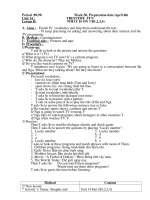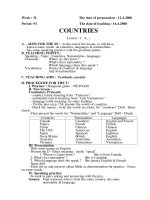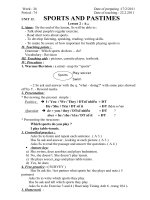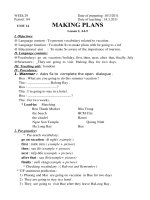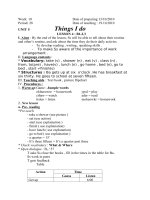Giáo án anh văn 11(unit 13-15)
Bạn đang xem bản rút gọn của tài liệu. Xem và tải ngay bản đầy đủ của tài liệu tại đây (344.62 KB, 23 trang )
Date of teaching: February 16
th
2008
Date: February 10
th
2008
Period: 79
UNIT 13: HOBBIES
Lesson 1: Reading
A. OBJECTIVES:
1. Educational aim:
-Helps S understand to their hobbies, and to know the way to talk about their hobbies by themselves.
2. Knowledge:- Helps S know the some vocabulary about the hobbies
B. METHOD: Integrated, mainly communicative
C. TEACHING AIDS:
Illustration, examples, textbooks, handouts
D. PROCEDURE: - Checking attendance: (1’)
- Checking up: (4’)
- New lesson: (40’)
TIME TEACHER’S ACTIVITIES PUPILS’ ACTIVITIES
5’
15’
I/ Warm up:
- Asks S to work in groups to look at the pictures and
write down what are in the pictures are doing.
T Gives some questions
- When do people do these kinds of things?
- What is your way of spending youe free time?
- What do you call things you do in your free time?
HOBBIES
T introduces the new lesson
II/ Before reading
Vocabulary:
T asks Sts the meaning and explains some new words
- accompany/ə'kʌmpəni/ (v)
accompaniment /ə'kʌmpənimənt/ (n)
accompanist /ə'kʌmpənist/ (n)
- tune (n)
- avid (adj)= very enthusiasm
- indulge /in'dʌl/ (v) = to allow yourself to have
or do sth for pleasure
- occupied = busy (adj)
Have Ss read the new words in chorus
While-reading
Task 1: Using a dictionary to get their meaning:
- Sts look at the picture and write down what
are in the pictures are doing.
Picture 1: playing football
Picture 2: swimming
Picture 3: playing the guitar
Picture 4: watching picture films
Picture 5: singing
- Sts give the answer
Đệm đàn cho ai
Nhạc đệm
Người đệm đàn
Giai điệu, ban nhac
Thiết tha
Ham mê , thích thú đ
-Read in chorus
Work in pairs to give the meaning
1. accomplish: tai ba, tai hoa
2. accompany: dem (dan)
7’
10’
8'
- T has Ss work in pairs to give the meaning
1. accomplish: well-trained, skilled
2. accompany: going with a singer, using a musical
instrument
3. modest: hamble, unasuming:
4. avid: eager
5. discarded: thrown away
6. induge in: allow oneself the pleasure of
7. keep me occupied: keep me busy
- Correct misteakes
Task 2: Answer the question:
-Ask Ss to read the passage individually and do task 2
in pairs
- Call on some Ss to write their answers of questions
3, 5, 7 and 9 on the board and the rest play parts to
ask and answer the questions
1. What is the writer's first hobby?
2. Is the writer an accomplished guitarist?
3. Why does the writer admire his uncle?
4. What is the writer's second hobbies?
5. How did he collect his fish?
6. What kind of stamp collect is writer?
7. Where does he collect the stamps?
8. Which does the writer get more of, local stamps or
foreign stamps?
9. What does the writer do with the less common
stamps and with the common one?
- Corrects and give comments
- Correct mistakes
IV/ After you read
Discussing
- Asks Ss to work in groups to talk about their hobby.
Homework: Ask Ss to write a short passage to
answer the questions
Among the three hobbies mentioned in the passage
which one are you interested in?
- What else would you do for it?
Preparation: Speaking
3. modest: nho, khiem ton
4. avid: say me
5. discarded: da bi bo di
6. induge in: dam me vao mot viec gi do
7. keep me occupied: lam cho toi ban ron
- Ss read the passage individually and do
task 2 in pairs
- Ss to write their answers of questions 3, 5, 7
and 9 on the board and the rest play parts to
ask and answer the questions
The answer:
1.His first hobby is playing his guitar.
2. No, he isn't
3. Because he's an accomplished guitarist
and he is good at accompanying people
singing by his guitar.
4. His second hobbies is keeping fish.
5. He bought some from the shop and
collected some from the rice field near his
house.
6. He is an avid stamp collector.
7. He collecs them from discarded evelopes
his relatives and friends give him.
8. Local stamps.
He keep the less common ones inside a small
album. The common one he usually gives
away to others or if no one wants them he
simply throws them away.
- S work in groups to fill in the blanks
- Sts read the answers
+ Write a short passage to answer the
questions
Preparation: List sth you like to do
Explain some new words and translate the
dialoge into Vietnamese
Date of teaching: February 16
th
2008
Date: February 10
th
2008
Period: 80
UNIT 13: HOBBIES (Cont')
Lesson 2: Speaking
A. OBJECTIVES:
1. Educational aim: by the end of the lesson, Ss will be able to:
-Ask for and give information about their hobbies
-Talk about their hobbies
2. Knowledge: Sts can make conversations and talk about collecting stamps
3. Skills: Fluency in expressing the hobby
Integrated, mainly communicative
C. TEACHING AIDS: pictures , textbook, board, chalk, chart.
D. PROCEDURE:
- Checking attendance:
- New lesson:
TIME TEACHER’S ACTIVITIES PUPILS’ ACTIVITIES
5’
10’
5’
- Greeting
- Checking up
I/ Warm up:
Ask Ss to close the book and work in groups to give
the verbs that go with STAMPS
Correct mistakes
Introduce the lesson
I/ Before you speak:
Task 1: Say which of the following you should
like/ not like to do and why
Ask Ss to work in pairs to ask and answer according
to the model.
Ex:
A: Which of the hobbies would you like to do?
B: Swimming. I like it best because I find it
interesting to swim in the swimming pool with
my friend. It's also good for my health and
help me to say fit.
A: And which one woulnn't you like to do?
B: Fishing. I'm not patient enough.
- Correct mistakes
II/ While speaking:
Task 2: Lan is talking to Huong about her bobbies
of collecting books. Practise reding their dialoge
with a partner.
Answer the question of the teacher
Close the book and work in groups to give the verbs
that go with STAMPS
The answer
- to collect
- to keep
- to get
- to buy
- to throw
- to classify
- to organize
- to exchange
STAMPS
Work in pairs to ask and answer according to the
model
A: Which of the hobbies would you like to do?
B: Watching TV. I like it best because I find it
interesting to get more knowledge and
entertainment.
………
10’
10'
5’
- Ask Ss to read the dialoge one times and pick out
some new words.
Vocabulary:
- stall /stɔ:l/ (n) = small shop
- classify /klǽsəfai/ (v)
- category /kǽtəgəri/ (n)
- name tag
Have Ss read the new words in chorus
- Ask Ss to work in pairs to practise the dialoge
- Correct some mistakes when Ss read the dialoge
Task 3: Make a similar dialoge about collecting
stamps:
- Ask Ss look through the suggestions in the text
book.
- Write down some new words
- Ask S to work in pairs to make the dialoge
- Remind some mistakes that Ss usually have.
Correct mistakes
IV/ Post-speaking
Talk about Ss hobies
Ask Ss to talk in individual
Homework: Write the dialoge on the book
V/ Comments:
Preparation: listening
Ask Ss:
- Explain some new words in before listening
- Find meaning of the Task 1 and 2
Read the dialoge one times and pick out some new
words.
Phan loaò
Theo tung loai
Nhan ten
Read the new words in chorus
Work in pairs to practise the dialoge
- Look through the suggestions in the text book.
- Write down some new wordsand explain
meaning.
Model:
T: What is your hobby, Lam?
S: Well, I like collecting stamps. I have been
collecting them more than five years.
T: Wow! You must have a lot of stamps noe.
Could you tell me how you collect your stamps?
S: I get them from old envelopes and sometimes
my relatives or my friends give me some. If I
have money, I can go to the post ofice and buy
some valuables ones.
T: Do you put them in categories?
S: In categories of course. I put local stamps in
one and foreign stamps in another, then I classify
them in categories like plants, birds, landscape …
T: I see. What do you plan to do next.
S: I will attend stamp exhibitions to learn more
rom experience collectors to make my collection
more valuable.
T: …
Talk about in individual
Explain some new words in before listening
- Find meaning of the Task 1 and 2
Date of teaching: February 16
th
2008
Date: February 10
th
2008
Period: 81
UNIT 13: HOBBIES (Cont')
Lesson 3: Listening
A. OBJECTIVES:
1. Educational aim: by the end of the lesson, Ss will be able to:
-Ask for and give information about their hobbies
-Talk about their hobbies
2. Knowledge: Sts can make conversations and talk about collecting stamps
3. Skills: Fluency in expressing the hobby
Integrated, mainly communicative
C. TEACHING AIDS: pictures , textbook, board, chalk, chart.
D. PROCEDURE:
- Checking attendance:
- New lesson:
TIME TEACHER’S ACTIVITIES PUPILS’ ACTIVITIES
5’
5’
15'
- Greeting
- Checking up
I/ Warm up:
Ask Ss make somes sentences as possible with
the words provided:
Stamps – fish – books – swimming
Ex: What kind of food do you like to eat?
Do you like swimming?
……
Introduce the lesson
I/ Before you listen:
* Write down three benefit of reading books.
Then share your ideas with the class.
Ask Ss to work in groups to give the answer.
Correct some mistakes
• Listen and repeat
Ask Ss to explain meaning some new words and
repeat after the teacher
Magazine /'mægəzi:n/
continually /kən'tinjuəli/
otherwise /ʌðəwaiz/
giganite /aigæntik/
profitably /brfitəbli/
available /əveiləbl/
bygone /'baign
ignorantly /ignərəntli/
Correct mistakes
II/ While listening:
- Going through the statements.
- Going through the vocabulary in task 1
Ss make somes sentences as possible with the
words provided
Work in groups to give the answer.
The answer:
- Books help to widen our knowledge.
- Books give us valuable experience.
- Books are good sources of information
- Books make our life better
……
Explain meaning some new words and repeat
after the teacher
Tiep tuc
Trai lai, nguoc lai
Khong lo, ket xu
Co loi, co ich
Co san
Da qua, qua khu
Biet it, khong biet
S: Maybe about reading books, magazines and its
benifit
5'
10’
5’
Task 1: Listen to his talk and decide whether the
statements are true (T) or false (F)
Let Ss read through the sentences to understand the
meaning.
- Explain some new words
- Have Ss listen two times
1. The writer started his hobby when he was young.
2. His parents were interested in reading fairy tales
and other stories to him.
3. The writer didn't start with ABC books.
4. Now he reads all the books available.
5. Reading help the writer to know many things.
6. According to the writer, by rading he does not
have to study hard.
7. The writer is able to know about a tiger through
reading.
8. Books might help him in his daily life.
- Checking up and corect mistakes
- Let Ss listen to again to check up mistakes
Correct mistakes
Task 2: Listen and write the missing words
Ask Ss to work in individual to read the passage once
and explain some new words before listening.
- Play the tapes two times
- Ask Ss works in pairs to compare the answer
The (1) _____ thing about reading is that I do not
have to learn things the very hard way. For example,
I do not have to catch a (2) _______ to know that it
can kill me. I know the danger so I can avoid it. Also
I do not have to go deep into the (3) _______ to dind
out about tigers. I can read all about it in a book.
Books provide the reader with so many facts and so
much information. They have (4) _____ helped me in
my daily life. I am better equipped to cope with
living. Otherwise I would go about (5) _______
learning things the hard way.
So I continue to read. Reading is indeed a good
hobby.
Listen again and correct mistakes
III/ After you listen:
Talking about the advantages of over-reading
(reading too much)
IV/ Comments:
Home work
In not more than 50 words, write about the
advantages of over-reading
Preparation: Writing
- Name of your collection/ How you collect them/ …
Read the sentences given before listeing to the
tape
Listen the tape the first time
Do exercise
1. T
2. F
3. F
4. F
5. T
6. T
7. T
8. F
Checking up and corecting mistakes
-Listen to again to check up mistakes
Work in individual to read the passage once and
explain some new words before listening
Works in pairs to compare the answer
The answer:
1. wonderful
2. disease
3. jungle
4. certainly
5. ignoranrly
Correct mistakes
Work in groups
Date of teaching: March 29
th
2008
Date: March 24
th
2008
Period: 82
UNIT 13: HOBBIES (Cont')
Lesson D: Writing
I/ Objectives: By the end of the lesson, Helps S understand to Describing the preparations for the coming
Asian Games
- Knowledge: : Helps S know the preparations for the coming Asian Games
- Skills: Integrated, mainly communicative
Illustration, examples, textbooks, handouts
II/ Materials: textbook, handouts
IV/ Procedure:
TIME TEACHER’S ACTIVITIES PUPILS’ ACTIVITIES
5’
10’
15’
15’
Greeting
Checking up
I/Warm up
Ask Ss to close the books and find the words going
with COLLECT
Correct mistakes
- Introduce the lessons
II/ Before writing
Have sts answer the following questions
1- Can you name your collection?
2- When did you start your collection?
3- How do you collect them?
4- How do you classify them?
5- How do you keep them?
6- Why do you collect them?
7- What do you plan to do next?
- Expession: to classify … into
II/While writing
Ss write a paragraph to describe the preparations for
the Games (in 15’).
Go around the class to help.
III/ After writing
Call two Ss to write on the board
Collect some papers to correct.
(suggested description)
My hobby is collecting stamps. I have been collecting both
local stamps and foreign stamps for more than 5 years so I
have a great collection now.
. My hobby got started when I was a little girl. I had always
wanted the beautiful pictures on the stamps so I thought a way
to keep them. At first I only collected local stamps which I got
- Work in groups to find the words going with
COLLECT
Example:
Stamps, stickers, dolls, toys cars, old money,
coins, pens, key rings, …
Answer the following questions
Example:.
1. stamp collection
2. 5 years ago
3. Both local stamps and foreign stamps from the
letters of friends and relatives
4. In categories, put stamps of animals, flowers,
birds, landscap, herroes on different pages.
5. In two albums, one for local and other for
foreign ones
6. Keep beautiful pictures on the stamps/ broaden
knowledge about the world/ an effective way to
be good at geography.
7. Join stamp exhibitions to learn from
experienced stamp collectors/ can expose
collection at an exhibition in the fure
Sts have to use the cues given to write a
paragraph to describe the preparations for the
Games if Vietnam is going to be a host country for
the coming Asian Games.
- Sts may start the description with
from the letters of my friends and relatives. Then my relatives
went abroad so many collection of foreign stamps started to
increase.
Now I have two albums, one for local and the other for
foreign ones. I classify the stamps into categories before
putting them into my stamp album. I put stamps of animals,
flowers, birds, landscape, heroes on different pages, which
makes ie easier to look for them.
When I have extra stamps of the same kind I often exchange
then with my friendss to enrich my collection. If I have money,
I also go to the post office to buy some valuables ones.
I am very proud of my collection. It helps to broaden my
knowledge about the world around me and it is also an
effective way to improve my geography.
I plan to join the stamp exhibitions to learn from experienced
stamp collectoras and maybe I can expose my collection at an
exhibition in the future.
IV/ HOME WORK:
-Asking Ss reread the passage they wrote And review
the use of relative pronouns and prepare the
language
Preparation: Language focus
Cleft sentences
- Subject, object and adverbial focus
Work in pair to read the writing together.
-write on the board
-whole class
- Take notes.
Date of teaching: March 27
th
2008
Date: March 20
th
2008
Period: 83
UNIT 13: HOBBIES (Cont')
Lesson 5: Language focus
I/ Objectives: by the end of the lesson, Ss will be able to
- Distinguish and pronounce the clusters / pt / / bd / / ps/ / bz/ correctly
- Review relative clauses and omit object relative pronouns correctly.
- Knowledge: Pronunciation: / pt / / bd / / ps/ / bz/
Grammar: Cleft sentences
Subject, object and adverbial focus
- Skills: Practicing to grasp grammar points
II/ Materials: textbook, handouts
IV/ Procedure:
TIME TEACHER’S ACTIVITIES PUPILS’ ACTIVITIES
5’
10’
Greeting
Checking up
I/ Pronunciation: / pt / / bd / / ps/ / bz/
Have sts listen to the teacher.
Have sts repeat the words in the book.
* Listen and repeat
/ pt / / bd / / ps/ / bz/
stopped
jumped
stepped
trapped
robbed
stabbed
grabbed
bribed
stops
steps
maps
shops
robs
bribes
rubs
clubs
* Practise the following sentences
Ask Ss to pay attention to the pronunciation then
repeat the words and sentences
- Correct the mistakes
-Models the three clusters / pt / / bd /
/ ps/ / bz/
for a few times and explains how to produce them.
-Reads once for Ss to hear the words containing these
clusters.
-Reads again and asks Ss to repeat.
* Practise reading aloud these sentences
-Asks Ss to work in pairs and take turn to read loud
the given sentences.(goes around to listen and takes
notes of the typical errors.)
-Calls on some Ss to read the sentences again and
provides corrective feedback.
II/ GRAMMAR: Cleft sentence
Ex: Bob would see Michelle after the movie.
S O averbial modifier
Different parts of the sentence can be emphasised in
this way:
- It was Bob who would see Michelle after the
movie. (Subject focus)
- It was Michelle who Bob would see after the
movie. . (object focus)
- It was after the movie that Bob would see
Listen and fill in this game
Pronunciation: / pt / / bd / / ps/ / bz/
Listen and repeat
Practice reading these sentences (6
sentences)
-
-Give their ideas from the ex.
-Take note
-Give their ideas from the ex.
-Take note
